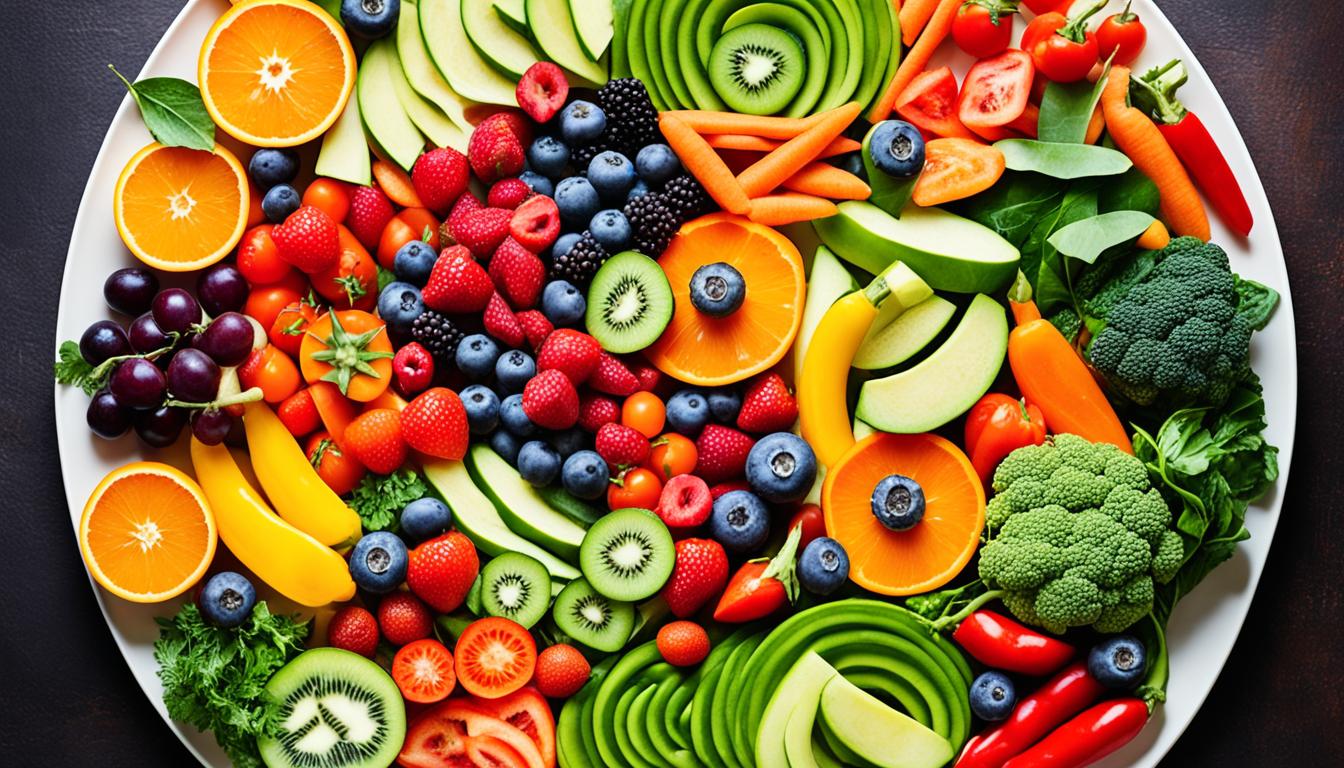Meal planning is a fundamental practice that can help you establish and maintain healthy eating habits. By mastering the basics of meal planning, you can create meals that are not only nutritious but also delicious, all while saving time and money. In this article, we will explore the essential elements of meal planning and provide you with a comprehensive guide to help you develop a successful meal planning routine.
Key Takeaways:
- Meal planning is a valuable tool for achieving healthy eating habits.
- It allows you to create well-balanced and nutritious meals while saving time and money.
- Meal planning ensures that your meals incorporate a variety of nutrient-rich foods.
- It helps you make smarter choices and avoid impulsive food purchases.
- By planning ahead, you can reduce food waste and feel more organized in the kitchen.
The Benefits of Meal Planning
Meal planning offers numerous benefits. It helps you make healthier choices by ensuring that your meals are well-balanced and incorporate a variety of nutrient-rich foods. By taking the time to plan your meals in advance, you can avoid relying on fast food or unhealthy options when you’re pressed for time or feeling hungry.
Meal planning also saves you time and stress. Instead of scrambling to figure out what’s for dinner, you can have the peace of mind knowing that your meals are already planned out. This allows you to focus on other important tasks or simply relax and enjoy your evenings.
Another benefit of meal planning is the potential to save money. When you plan your meals in advance, you can make a shopping list based on the ingredients you need, which helps you avoid impulse buys and reduce food waste. Additionally, by incorporating budget-friendly meal ideas and utilizing ingredients in multiple meals, you can stretch your grocery budget even further.
With a solid meal plan in place, you’ll feel more organized and confident in your ability to stick to your healthy eating goals. Meal planning provides structure and accountability, making it easier to resist temptations and make choices that align with your health objectives.
Getting Started with Meal Planning
To begin your meal planning journey, it’s important to assess the food you already have on hand. Take a look in your pantry, refrigerator, and freezer to see what ingredients you can incorporate into your meal plan. By utilizing what you already have, you can reduce waste and save money on groceries.
Once you know what ingredients you have, it’s time to map out your meals for the week. Consider planning breakfast, lunch, dinner, and snacks. Take into account your schedule and any events or commitments that may affect your meal prep time. Planning ahead will help you stay organized and make the most of your meals.
Meal planning templates and apps are great resources for keeping everything in order. They can help you stay organized, track your meals, and create grocery lists. These tools can simplify the process, especially for beginners. Consider using a meal planning template or app to make your meal planning experience seamless and stress-free.

By taking these essential steps, you’ll be well on your way to mastering meal planning for beginners. With careful planning and the use of templates or apps, you can create a balanced and nutritious meal plan that suits your lifestyle and goals.
Creating a Grocery List
Now that you have your meals planned out, it’s time to create a grocery list. This step is crucial to ensure you have all the ingredients you need for your meals and to stay focused when you go shopping. To start, take a look in your pantry and cross off any items you already have. This will prevent you from buying duplicates and help you save money.
Making a list is not just about making sure you don’t forget anything, it’s also a smart way to stick to your budget. Consider incorporating budget-friendly meal ideas into your plan. Look for sales, discounts, and coupons to get the best deals on the ingredients you need. You can also choose ingredients that can be used in multiple meals to stretch your budget even further.
To make meal prep easier and quicker during busy weekdays, try to prepare as much as you can in advance. Spend some time chopping vegetables, cooking grains, or marinating proteins. This will save you precious time in the kitchen and make it easier to put together your meals when you’re short on time.

Your Shopping Strategy
When you’re at the store, stick to your list and resist the temptation to impulse buy. It’s easy to get distracted and end up with items you don’t really need. It’s important to stay disciplined and focused on your budget-friendly meal plan. Remember, every item you purchase should have a purpose and be a part of your meal plan.
If you come across a great deal on an ingredient that you frequently use, consider stocking up and making multiple meals with it. This can help you save money in the long run and give you more flexibility with your meal choices. Just make sure the ingredients are ones you enjoy and can be easily incorporated into your meals.
By creating a grocery list and following these budget-friendly meal ideas and meal prep tips, you can save time, money, and effort while still enjoying delicious and nutritious meals.
Preparing and Cooking Meals
To make meal prep efficient, consider scheduling a prep day where you can chop vegetables, cook grains, and prepare any other ingredients that will save you time during the week.
Try grouping meals together that can share common ingredients, so you can cook once and eat twice or more. For example, if you are making a batch of roasted vegetables for one meal, consider making extra to use in salads or as a side dish for other meals.
By planning and preparing ahead, you can ensure that your meals are nutritious and easy to assemble during busy weeknights.

Efficient Meal Prep Schedule
“A little effort upfront can save you valuable time later in the week. By dedicating a few hours on a prep day, you can streamline your meal preparation and make healthy eating a breeze.”
Having a designated prep day allows you to focus on the tasks involved in meal prep without distractions. Choose a day that works best for you, whether it’s a weekend or a weekday evening.
During your prep day, start by organizing your ingredients and cleaning and chopping vegetables. This way, you’ll have everything ready to go when it’s time to cook.
Consider cooking grains, such as quinoa or brown rice, in bulk. Cooked grains can be stored in the refrigerator and used as a base for various meals throughout the week.
Additionally, take advantage of kitchen appliances like slow cookers or Instant Pots to prepare meals that require longer cooking times. These appliances allow you to set it and forget it while you focus on other tasks.
Meal Planning and Batch Cooking
“Batch cooking and meal planning go hand in hand. By combining these strategies, you can save time and ensure a steady supply of healthy meals throughout the week.”
When creating your meal plan for the week, consider incorporating meals that can be prepared in larger quantities and eaten as leftovers. Soups, stews, and casseroles are great options for batch cooking.
It’s also helpful to choose recipes that share common ingredients. For example, if one recipe calls for diced onions, use the same batch of diced onions for another recipe instead of chopping them separately.
By maximizing the use of ingredients and cooking in bulk, you’ll save time and effort in the kitchen while maintaining a variety of meals.
Conclusion
Meal planning is a valuable tool for improving your eating habits and maintaining a healthy lifestyle. By dedicating time to plan your meals and grocery lists, you can make smarter choices, save precious time and money, and reduce stress in the kitchen.
Whether you’re a beginner or have experience with meal planning, incorporating these basic tips and strategies into your routine will set you up for success. Using a weekly meal planner can help you stay organized and ensure you have a variety of nutritious meals throughout the week.
With meal planning, you can enjoy delicious and healthy meals every day. Take advantage of the numerous benefits, such as having well-balanced and nutrient-rich dishes, saving money through reduced food waste and avoiding impulsive food purchases. By implementing these meal planning basics and using a weekly meal planner, you’ll be able to effortlessly maintain a healthy diet while enjoying the convenience and satisfaction of home-cooked meals.
FAQ
What is meal planning?
Meal planning is the process of organizing your meals in advance by creating a plan for what you will eat throughout the week.
Why is meal planning important?
Meal planning is important because it helps you make healthier choices, saves you time and money, and reduces stress in the kitchen.
How can meal planning benefit my health?
Meal planning can benefit your health by ensuring that your meals are well-balanced and incorporate a variety of nutrient-rich foods.
How does meal planning save me time?
Meal planning saves you time by allowing you to plan in advance and avoid last-minute meal decisions. It also helps you streamline your grocery shopping and meal prep.
Can meal planning help me save money?
Yes, meal planning can help you save money by reducing food waste, limiting impulse purchases, and incorporating budget-friendly meal ideas into your plan.
How do I get started with meal planning?
To get started with meal planning, take stock of the food you already have, map out your meals for the week, and consider using meal planning templates or apps to help you stay organized.
How do I create a grocery list for meal planning?
To create a grocery list for meal planning, start by listing the ingredients you will need for your planned meals and cross off any items you already have in your pantry. This will help you stay focused at the store and avoid unnecessary purchases.
How can I prepare and cook meals in advance?
To make meal prep efficient, schedule a prep day where you can chop vegetables, cook grains, and prepare any other ingredients that will save you time during the week. You can also group meals together that share common ingredients to cook once and eat twice.
Source Links
- https://thenourishinghome.com/2012/03/mastering-meal-planning/
- https://www.verywellfit.com/an-example-of-a-healthy-balanced-meal-plan-2506647
- https://www.myplate.gov/tip-sheet/meal-planning


